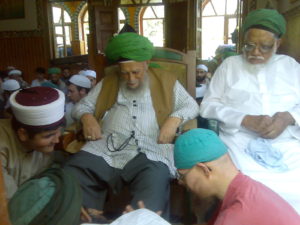 When we consider our relationship with all other human beings, with all Muslims, with all those in Tariqah, and with our shaykh and other murids in the Naqshbandi Tariqah, what do we see? It is quite clear that our importance as human beings, as Muslims, as those in Tariqah, and in the Naqshbandi Tariqah, is of very little significance if we look at numbers. There is no doubt that the importance of any individual, and here I am referring to us, lies primarily in his relationship with his Lord and the final Messenger of that Lord. This relationship is expressed primarily according to the station that our Lord has granted us. Of course, the station depends, amongst other things, on the extent to which we have become obedient servants to our Lord within the overall structure of Islam.
When we consider our relationship with all other human beings, with all Muslims, with all those in Tariqah, and with our shaykh and other murids in the Naqshbandi Tariqah, what do we see? It is quite clear that our importance as human beings, as Muslims, as those in Tariqah, and in the Naqshbandi Tariqah, is of very little significance if we look at numbers. There is no doubt that the importance of any individual, and here I am referring to us, lies primarily in his relationship with his Lord and the final Messenger of that Lord. This relationship is expressed primarily according to the station that our Lord has granted us. Of course, the station depends, amongst other things, on the extent to which we have become obedient servants to our Lord within the overall structure of Islam.
We are mentioning all of these to you for us to understand our position in the greater arrangement of things on this planet. In everything that goes on on this planet, what stands out as important is: “What is the station or darajah that we are occupying by our Lord?” If we have a serious look at our lives and with what we are engaged in and also our final destination, then we do not think that there is any matter of greater importance for our salvation than the station we occupy.
Of course, the stations available to us are multifarious, and in each station there are different levels. It is often said that all the pious people, to whatever extent they might be pious within the broad category of Wilayah, i.e. Divine Friendship, but this category has a variety of levels; and so, one might occupy this station as a Messenger of Allah (ﷺ), or as His Prophet (a.s.) or whatever the case might be. Thus, we say that Nabi Muhammad (ﷺ), although the greatest Messenger and Prophet of all time, is under the dome of Divine Friendship, but this level in this station is so special that he (ﷺ) is considered to be at the highest category of such Divine Friendship; way above all other categories. To him (ﷺ) it is a specialty of such magnitude that Allah (ﷻ) placed him (ﷺ) at the forefront or as the leader of the intensely pious. All the others in this category are way below him (ﷺ) in piety and religious achievement. We have to understand this. We have to understand that although we might say that the Messenger of Allah (ﷺ) falls within the station of Divine Friendship that station for him (ﷺ) is so unique that today he (ﷺ) witnesses his (ﷺ) Lord at all time as the most beloved.
We wish to digress a little because of a deep concern over the slowness of the spiritual progress of so many individuals. Our brotherhood or sisterhood is expressed in our deep concern for each other and for what each one of us is able to attain or should attain. On previous occasions I have mentioned to you how Allah Almighty has given certain individuals power to impact on the hearts of others and to help in raising their status. In our case the one responsible for this is Mawlana Shaykh Nazim. In other words, he must have access to our hearts. This is so important to understand. How can our shaykh have spiritual access to hearts that are not busy with the remembrance of our Lord and which is occupied with a large number of matters that are other than their Lord? On many occasions we supplicate and ask very intensely: “O our Lord, purify our hearts from other than Thee.” We ask this but we engage ourselves in so many matters that are other than our Lord; all the worldly matters. How can our shaykh gain access to a heart filled with the affairs of this world?
It is quite clear, according to our understanding, that the heart is the centre at which spiritual progress is recorded. In other words, it is the heart of an individual that is raised to particular categories and to levels within those categories. The heart must therefore always be in a state of being prepared for these changes. The preparation of the heart or its purification is directly linked with the amount of ibadat that we do; the more ibadat the more the purification, and the more the purification the easier the access to the heart. If one is engaged in a considerable amount of worldly affairs, which impact on one’s heart, then it is very difficult for access to be gained to that heart and for spiritual improvements to be brought about. We do not know how this works, because we are not in the class of those pious people who are able to bring about changes in other people’s hearts. We are not in their class, therefore we do not understand.
In all the writings that deal with this matter, there is an insistence that the murid engages in long periods of silence as part of the preparation of the heart. The more the silence and the more the ibadat, the more intensive is the purification process. Those of us who engage in considerable talk, are occupying the heart with matters which discourage purification.
In Lefke, a number of us used to sit very quietly in the presence of our shaykh. We asked nothing and we said nothing. We did this so that our hearts could always be available for spiritual improvement. There were others, who were always engaged in talking noise. Mawlana would bow his head slightly and occasionally look up. We were in the presence of one of the great pious people on this planet and some of us did not understand the adab of silence, especially the need for such silence to allow Mawlana to engage our hearts. On one occasion he remarked that whenever he tries to access some hearts then those hearts are engaged and he imitated the engaged signal of the telephone to indicate to us what he was talking about.
You see, one of the impacts of the different forms of ibadat is that it helps to create a canopy of peace through silence around one. This peace is of a double nature; external peace created through the intensification of ibadat, an internal peace as a consequence also of such intensification. And so, one is immersed and enveloped in peace through silence. The silence is encouraged by ibadat with the heart or with mind, as we say, and not with the tongue. And so the individual, engaged in silent forms of ibadat creates for himself a space both external to him and internal to his heart in which the remembrance of his Lord takes presidence.
Those of us who talk so much are interfering with these processes and are creating around one and within one noises that counteract spirituality. How else must one put this to you? How else must one explain the need for us as we grow in this Tariqah to become quiet or silent individuals. Talking all the time is not of the characteristic of the pious people, because they cannot engage in the remembrance of their Lord in an atmosphere of noise.
I read the other day of Naqshbandi shaykhs who used to cover themselves totally with a sheet when they engaged in adhkar. In this way they cut themselves off completely from their surroundings, especially its noises, and they went into a kind of minor seclusion. They wanted to be alone with their Lord and so they threw a sheet over themselves to have a quiet session of adhkar.
I want to repeat one thing to you. There is something seriously wrong if you engage in considerable ibadat and still talk all the time. Somewhere along the line there is interference in your ibadat, which is causing you not to become a silent individual. I do not know what it is but all of those who engage in considerable talk should examine themselves. We ask Allah Almighty to characterise us with silence; a deep spiritual silence for our own spiritual good, amin.
[Letters to Seekers on the Spiritual Path Vol 3 – Unpublished 2012]



